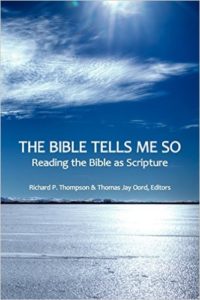John Wesley’s View of Scripture
Both conservative and progressive Christians admire John Wesley. But his statements on the Bible may surprise people in both camps.
I’m offering a free copy of Randy Maddox’s essay on John Wesley and the Bible. The essay was published in a book I co-edited with Richard Thompson, The Bible Tells Me So, and elsewhere. Those who sign up for my newsletter (see the signup area on my website homepage or at this page) will get access to Randy’s essay in an upcoming newsletter edition.
To give you a small taste of the topics in Randy’s essay, I thought I’d offer a few highlights. There is MUCH more in the full essay, so please consider signing up on the newsletter for the full version.
MAN OF ONE BOOK
Many Christians know John’s Wesley’s claim that he is man of one book. “Let me be homo unius libri,” says Wesley, with Latin flare.
But Wesley was far from being concerned with literally only one book. He read widely and required his ministers to read many other books. Wesley scolded his ministers who claimed to read only the Bible as exhibiting “rank enthusiasm.” That’s like calling someone today a raving religious lunatic!
By homo unius libri, Wesley meant he regards no book comparatively but the Bible. Scripture is the first book of importance, but not the only important book.
Wesley drew upon other sources, including scholarly tools, when reading the Bible. He appreciated textual criticism, says Maddox, but was less warm to historical criticism.
ERRORS IN THE BIBLE?
When it comes to the question of biblical errors, some will quote Wesley’s letter to William Law (see correction to this attribution in blog comment below). “If there be one falsehood in the Bible,” writes Wesley, “there may be a thousand; neither can it proceed from the God of truth.”
Wesley never used the phrase “biblical inerrancy,” however, nor did he embrace its modern understanding. Modern biblical inerrancy, says Maddox, “insists that the Bible is accurate in every detail, including historical allusions and descriptions on the natural world.” Wesley wasn’t concerned with this, and occasionally he notes apparent discrepancies in the biblical text.
Wesley’s comments about the trustworthiness of the Bible focus on what calls the “rule of Christian faith and practice.” Wesley followed 2 Timothy 3:16–17, in which inspiration of Scripture is related to its usefulness for instructing in Christian belief and training in lives of righteousness.
FREE WILL AND THE BIBLICAL INSPIRATION
One of my favorite parts of Randy Maddox’s essay deserves a full quote. Here’s Randy notes some implications human freedom has on thinking about biblical inspiration:
“Wesley’s descendants may want to … suggest that his conviction about how God works in salvation—by undergirding and assisting our will, but not overriding our liberty—has broader implications than he realized. Applied to God’s agency in inspiring the human authors of Scripture, this conviction would allow one to take with utmost seriousness the cultural specificity of the various books in the Bible that modern scholarship makes evident, while still affirming a robust sense of the authority of Scripture as the “book of God.”
I am advocate precisely what Maddox says. That is, I think we should take as central Wesley’s insight that God assists but does not override the freedom God gives creatures.
Placing this insight at the heart of our understanding of God helps us solve a host of theological problems related to evil, science, and the inspiration and interpretation of the Bible. With regard to the Bible, it suggests that free human authors of Scripture can make errors or have misunderstandings that do not affect the main message in the biblical text.
INTERPRETING THE BIBLE
Wesley’s deepest concern was personal embrace of the saving truth in Scripture. We need the Holy Spirit to understand it well. Even “the devils” believe the Bible, says Wesley, but they do not embrace its saving truth for themselves.
Wesley believes we need to read the Bible “in conference” with others. Some people are simply more mature, and we can benefit from their insights if we listen in community. Meeting in groups to study the Bible is important for forming people and helping to identify the Bible’s central purposes.
Wesley recognized the limits of all human understanding. Even spiritually mature persons see through a glass darkly when interpreting the Bible. Wesley writes:
“Although every man necessarily believes that every particular opinion which he holds is true (for to believe any opinion is not true, is the same thing as not to hold it); yet can no man be assured that all his own opinions, taken together, are true.”
Part of interpreting the Bible well, says Maddox, involves “not limiting our dialogue partners to those who are most like us, or those with whom we already agree.” Those who see things differently than we do might identify places where our understanding of something in Scripture might be wrong.
Wesley appealed to what he called “the Rule of Faith” as a tool for interpreting the Bible. The rule of faith identifies the central and unifying themes in the Bible. Difficult, ambiguous, or obscure passages should be interpreted in light of Scripture’s central themes.
Wesley also thought God’s revelation in the natural world could help us interpret the Bible’s special revelation. “And when Wesley confronted an apparent conflict between current science and Scripture,” says Maddox, “he sought an understanding that did justice to both.”
THE CORE OF THE BIBLE
Perhaps Wesley’s most distinctive way of reading the Bible pertains to the lens of love he used to interpret it. Wesley recognized that Christians regard some interpretive lenses as better than others. He writes:
“We know, ‘All Scripture is given by inspiration of God,’ and is therefore true and right concerning all things. But we know likewise that there are some Scriptures which more immediately commend themselves to every [person’s] conscience.”
Wesley prized the theology of 1 John above all others. Maddox notes that Wesley “used 1 John for his sermon text much more frequently (comparative to the number of verses in the book) than any other biblical book.”
Wesley said 1 John 4:19 — “We love [God] because he first loved us” — is “the sum of the whole gospel.” The book stresses clearly God’s goal to transform us so that we might love both God and neighbor and live lives free from the tyranny of sin.
Maddox summarizes:
“Wesley increasingly and self-consciously read the whole of the Bible in light of a deep conviction that God was present in the assuring work of the Spirit both to pardon and to transform all who respond to that inviting and empowering love (and all can respond!). This conviction was not something that Wesley thought he was imposing on Scripture. He was convinced that it was the most central and clear message of Scripture—as seen particularly in 1 John and related texts. At the heart of reading the Bible in “Wesleyan” ways today would be embracing Wesley’s central interpretive lens, even as one continues to test and refine it by ongoing conference with the whole of Scripture and the range of other readers.”
CONCLUSION
I said at the outset that you can get Randy’s whole essay by signing up for my newsletter. But I should also suggest you consider getting the whole book from which Randy’s essay comes.
The Bible Tells Me So: Reading the Bible as Scripture is nearly 500 pages in length. It has 30 chapters, half of which discuss topics like inerrancy, Dead Sea scrolls, preaching, and interpretation. The other half address books of the Bible. Richard Thompson and I edited the book, and many have used it as a resource for their study and teaching. Click here for more info…

Comments